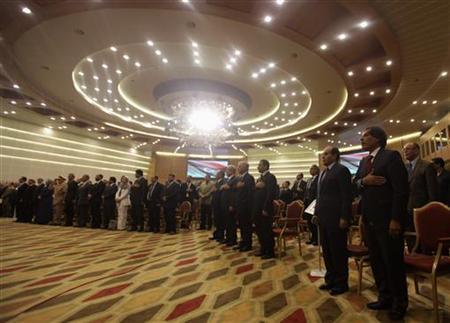By Nigel Ash

Tripoli, 5 July 2013:
The two largest political parties in the General National Congress have each announced that, for different . . .[restrict]reasons, they will be boycotting sittings. Both the National Forces Alliance and the Justice and Construction Party say they will only attend to help work on the creation of the new constitution.
The National Forces Alliance was first to declare its hand at a press conference today. Party spokesman Tawfiq Shahibi said the legislature “has been side-tracked from its major goals” and expended most of its energies debating secondary issues that had “wasted” its time.
The NFA has in the past threatened a boycott but this afternoon Shahibi spelt out the party’s intention to suspend immediately all work in the Congress , except that relating to the new constitution. The NFA is the largest single party in the parliament with 36 of the 80 seats allocated to political parties in the 200-seat chamber.
When it was elected, a year ago on Sunday, the GNC’s prime role was to oversee the drafting of a new constitution, to be approved by a referendum and under which fresh elections would then be held.
One year on, and members of congress have only managed to agree on a 15-member committee which will draw up the law for the election of a 60-member commission which will actually draft the new constitution. The 15-member commission, which was appointed on 15 April had 45 days in which to produce the draft law. Nothing has yet emerged. Indeed, the original 18-month timeframe for a new congress, elected under the new constitution, to be holding its first debate, has become evermore un-doable.
While the NFA’s withdrawal from all but work on constitutional issues might not of itself impact on general debates, the absence of its members from GNC committees, where much of the legislature’s work is done, will be more serious.
The compound effect of the decision announced this evening by the Justice and Construction Party, with its 17 members, to mount its own boycott is however, seems certain to mean serious disruption to the GNC’s business.
The JCP advanced as its main reason for withdrawing from all but constitutional work, that it wanted to help the stability of the country and it was not satisfied with the way that the GNC was dealing with important issues.
Some members of congress are taking a more jaundiced view of the boycotts. Juma El-Gamaty, who leads the Taghyeer Party said that he believed that in the case of the NFA, the move was to try to mask the fact that it was now down to less than 25 members, after some congressmen resigned and others were suspended by the old Integrity Commission.
Gamaty went on to speculate that maybe there was a plan to bring on a crisis that would lead to the dissolving of the GNC, which might bring about the cancellation of all its legislation, including the Political Isolation Law.
“Statesmen and history makers never turn against any democratic decisions they were part of,” said Gamaty, “even if the outcome was the opposite of what they wanted … nor do they put the interests of a political leader, party, group or tribe over the interests and the future of the country as a whole, especially in a historic and coherent moment.”
Frustration with the GNC is of course far from confined to GNC members. The latest example of rising public despair at the performance of elected politicians was a stunt by young people in Zawia, who this evening took planks and nailed up the doors of political party offices in the town.
The GNC had planned no official celebrations for Sunday’s first anniversary of Libya’s historic vote. If nothing else, given today’s events, this was fortunate. [/restrict]








